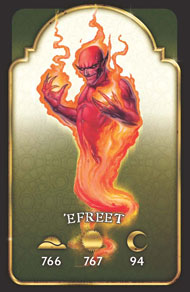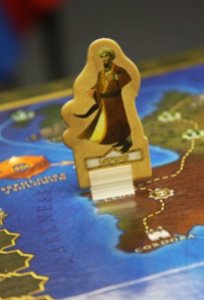Tales of the Arabian Nights: In the name of Allah, the Compassionate, the Merciful

[It’s not everyday that a game review article inspires you to write a book. But this expiremental review not only felt good as a review, it felt like a good start to a story. Now I’m 60,000 words into my book based on the little tale that interupts this review. When I first started writing game reviews, it was for the sake of improving my own writing. I hoped that my articles would help me write my book. I never thought the two would be so intertwined…]
This review was originally posted at Guilt-Free-Games.com.
raise be to Allah, the Beneficent King, the Creator of the Universe, who hath raised the heavens without pillars and spread out the earth as a bed. The games of former generations are a lesson to posterity; that a man may review the remarkable games that others have experienced, and be admonished. Extolled be the perfection of Him who has thus ordained that the history of former games be a lesson to those which follow. Such are The Tales of Arabian Nights, with its intriguing stories and clever gameplay.
In Tales of Arabian Nights, players take turns going to locations on an ancient map of the world, centered around Baghdad, The City of Peace. When a player moves to a location, he flips over the top card of the fate deck, gaining the pleasure of having an encounter with an elephant, for example. Random modifiers are added which tell the player what matrix they are using for this encounter. That player then chooses his response from a selection on the matrix (for example, he may pray to the elephant, or perhaps, try to kidnap it) and the person with the story book opens to the appropriate encounter number.
That player’s mini-story is then told by the narrator, but the result may differ based upon the character’s skills, or a choice they make within that story. For example, while playing in a game last week, I encountered an evil Vizier who had come into power in the of city of Cairo. It was rumored that any man who dared speak against this powerful sovereign of the Sultan would be set upon by his savage ape that blasphemed against Allah by learning how to talk like a man. A crowd, curious to the Vizier’s Ape’s expostulations had pressed in close, but I saw cruelty in the Vizier’s eyes and wished nothing but to slip away from the crowd. The Vizier, though, hawk-like in his demeanor and desirous to learn the faces of his new subjects, spotted and made a lesson of me. “Look at that man, over there!” he triumphed, “Confronted with a wonder as strange and mysterious as my talking ape, he tries to shirk away as if to avoid it would be to akin to it not existing. Verily, his actions remind me of the story of the farmer and the Ifrit.”
 The result is nothing short of magic. There are over 2002 stories in the story book, many unique to specific locations. Each choice on the matrix is altered by so many numbers that it is dizzying to imagine the editors getting the tangle of their story lines straight. Adding to the magic, the active player rolls a die that determines if he will get that story, the story on the number before it, or the story on the number after it, so even if a player gets the exact same thing in the exact same location adding all of the same modifiers together, and choosing the same responses, they have a good chance of not experiencing the same story twice. The Ifrit may be kind, or cruel, depending on which story is being read. Even though the farmer had never witnessed an Ifrit before, he knew that this was one of the most beautiful creations to stand beneath the splendor of Allah. The Ifrit’s hair entwined around her most pleasing frame, and lusty was her nature. With a single bound, she launched into one of the farmer’s date trees and made a wedding bed of it, beckoning the farmer to approach, as was her want.
The result is nothing short of magic. There are over 2002 stories in the story book, many unique to specific locations. Each choice on the matrix is altered by so many numbers that it is dizzying to imagine the editors getting the tangle of their story lines straight. Adding to the magic, the active player rolls a die that determines if he will get that story, the story on the number before it, or the story on the number after it, so even if a player gets the exact same thing in the exact same location adding all of the same modifiers together, and choosing the same responses, they have a good chance of not experiencing the same story twice. The Ifrit may be kind, or cruel, depending on which story is being read. Even though the farmer had never witnessed an Ifrit before, he knew that this was one of the most beautiful creations to stand beneath the splendor of Allah. The Ifrit’s hair entwined around her most pleasing frame, and lusty was her nature. With a single bound, she launched into one of the farmer’s date trees and made a wedding bed of it, beckoning the farmer to approach, as was her want.
The farmer had heard of terrible things that Ifrits have done to mere humans, and was panicked. He knew that running from a predator was bad, but, too afraid to answer the Ifrit’s beckons, he continued to maintain his field. The Ifrit doubled her efforts and cooed lewdly to the farmer, but the farmer ignored the Ifrit, and doubled his focus on his crops.
Spurned by the farmer’s vigilance, the Ifrit pouted, “Allah be praised, but I do not understand you humans. All you talk about is embracing one another, but when the opportunity presents itself, you are too pious or restrained or old to do the act. Perhaps if you were a savage full of strength you would vault yourself to me.” And with that, the Ifrit turned the farmer into an ape.
“Oh no!” Cried the ape, “What am I to do! Even in this form, I could not possibly expect to beat an Ifrit in combat! But, yes, I have heard that the Vizier of this land is a powerful wizard! If anyone can help me it must be him!”
 It’s hard to call Tales of Arabian Nights a game; it feels more like an adventure in a box. Sure, there is a semblance of strategy. Players may find it wise to choose options that reflect their skills (for example, if you have piety, praying will probably be better than bad). Most decision making, though, is arbitrary. That’s not to say players aren’t taking an active part in the game, but the ‘good gameplay’ here means deciding upon interesting interactions, and absorbing storytelling skills. Like Eastern Philosophy to a Western Imperialist, the game can be damnably evasive. People must approach the game desiring to have a good time over employing good skills or they will experience neither. It was a mantra that the Vizier took to heart. For if his wife ever found that he had dalliances with the local peasantry, she would never forgive him. That was, of course, why he had to create a Simulacrum of himself to sit upon his throne while there was no business to attend to.
It’s hard to call Tales of Arabian Nights a game; it feels more like an adventure in a box. Sure, there is a semblance of strategy. Players may find it wise to choose options that reflect their skills (for example, if you have piety, praying will probably be better than bad). Most decision making, though, is arbitrary. That’s not to say players aren’t taking an active part in the game, but the ‘good gameplay’ here means deciding upon interesting interactions, and absorbing storytelling skills. Like Eastern Philosophy to a Western Imperialist, the game can be damnably evasive. People must approach the game desiring to have a good time over employing good skills or they will experience neither. It was a mantra that the Vizier took to heart. For if his wife ever found that he had dalliances with the local peasantry, she would never forgive him. That was, of course, why he had to create a Simulacrum of himself to sit upon his throne while there was no business to attend to.
The farmer, now turned talking ape, burst into the throne room of the Vizier, dragging royal guards behind him. No one was allowed to see the Vizier’s royal Simulacrum when he was away. It was too dangerous, since the Vizier’s Simulacrum had no proper knowledge of how to run a state, nor did he know any true magic. The ape, though, having burst into the Vizier’s chambers, recounted his endeavor with the Ifrit and stunned his audience. The Simulacrum, moved by this tale, armed himself and ordered the ape to direct him back to his farm so that he could deal with the Ifrit. When they arrived, they found the Ifrit asleep in the date tree. Knowing that Ifriti are deep sleepers, the simulacrum ordered his guards to take the Ifrit back to his palace. Upon the throne of his master, the Simulacrum commanded the Ifrit to awaken. “I am Vizier of this city!” He stormed, “And a powerful wizard! Upon hearing my humble servant’s story of how you treated him, I called the winds to transport you before me so that you may defend yourself against your accuser. What do you have to say for your actions?”
The Ifrit quaked in fear, for any wizard powerful enough to turn the winds against her must be potent. She dropped to her knees and pleaded for her life, and promised to Allah On High that if the Vizier forgave her that she would turn the ape back into a farmer and leave his city at once. “No,” replied the simulacrum, “then you would learn nothing. Instead, I shall give you a trial. There is a man in this city who is a powerful wizard. His hubris is so great that he has dared to turn his countenance into mine! Destroy this miscreant, and all shall be absolved!”
 Two player games of Tales of Arabian Nights should work well, but may be too intimate to play with another friend. When is the last time you called a friend over so that you could lounge on pillows and tell each other fables of far off places? That said, this game seems like a perfect date game among two creative people… especially if one of those people isn’t a gamer. That’s an important point, so I’ll stress it again: If you have friends who don’t understand your gaming hobby, this might be the perfect game to show them.
Two player games of Tales of Arabian Nights should work well, but may be too intimate to play with another friend. When is the last time you called a friend over so that you could lounge on pillows and tell each other fables of far off places? That said, this game seems like a perfect date game among two creative people… especially if one of those people isn’t a gamer. That’s an important point, so I’ll stress it again: If you have friends who don’t understand your gaming hobby, this might be the perfect game to show them.
Tales of Arabian Nights can either pose as an introductory game to the gaming hobby genre for those who are interested, but don’t want to get invested. It can also pose as a game to play with people who don’t like games; just explain that Tales is more like a Choose Your Own Adventure Book, and see if they take the bait. She did, and flew off to find the Simulacrum’s master. With tremendous speed, the Ifrit tore through the city, searching every shop and alley for the Vizier. When she encountered him, the Ifrit took the wizard by surprise and removed his torso from his waist before he could utter a spell. Afraid to return to the palace, the Ifrit left the city, never to return. When the Simulacrum’s story reached the ears of the Sultan, he was saddened at the loss of a Vizier. But, decided the Sultan, if the Simulacrum was made of the same material as the Vizier, he should make a good Vizier himself. The Sultan gave his blessing to the Simulacrum, but put him in charge of Cairo to make certain the people of his own city did not rise against him. “And that is why, I stand before you as your Vizier. And also why those that foolishly avoid confrontation will be confronted with their foolishness. Arrest that man!”
 While a two player game may be intriguing, Tales of Arabian Nights has the unusual distinction of being an ideal game for three players. During a player’s turn, the person to the active player’s right handles the Story Matrix, while the person to the active player’s left reads from the Story Book. In a three player game, this keeps everyone involved in each other’s story, and not wandering off to the refrigerator, or checking something on the internet when it isn’t their turn. In Tales of Arabian Nights, keeping players at the table can be crucial. It may not seem important, but the more disjointed each player’s story appears, the less people talk about their stories as a whole. The less people see their story as part of a larger adventure, the more the game just seems like a bunch of random one-liners.
While a two player game may be intriguing, Tales of Arabian Nights has the unusual distinction of being an ideal game for three players. During a player’s turn, the person to the active player’s right handles the Story Matrix, while the person to the active player’s left reads from the Story Book. In a three player game, this keeps everyone involved in each other’s story, and not wandering off to the refrigerator, or checking something on the internet when it isn’t their turn. In Tales of Arabian Nights, keeping players at the table can be crucial. It may not seem important, but the more disjointed each player’s story appears, the less people talk about their stories as a whole. The less people see their story as part of a larger adventure, the more the game just seems like a bunch of random one-liners.
I felt the massive hand of the ape come down upon my shoulder. His grip was, at once, strong, but kind. As we walked away from the center of town, I turned to face him, but he looked away, as if he was embarrased to be arresting me. “It seems to me,” I said, “that the Simulacrum was most unkind to you. He could have let you turn back into a farmer, but instead he used his clever nature to increase his status, and keep a powerful warrior.”
“It is true,” replied the ape. “I miss my fields, my wife and my children. I would do anything to be with them again.”
“Anything? Tell me friend, have you ever heard the story of the Singing Lamp of Bombay?”




















